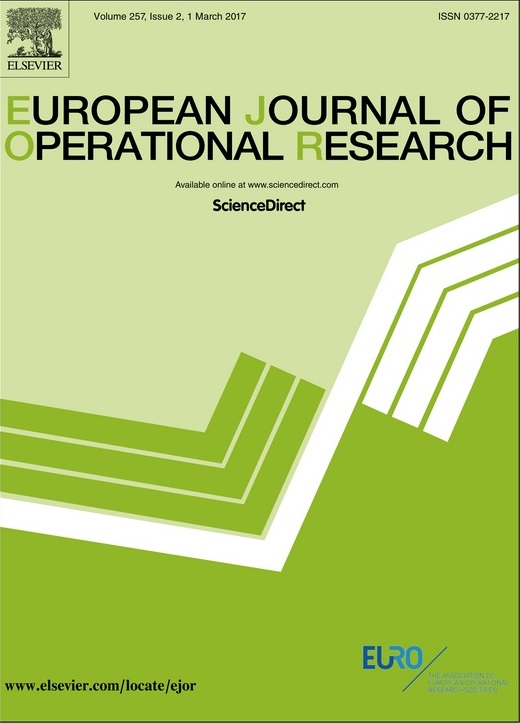Charter of the EURO Forums
The following charter, adopted by the EURO Council on 2020.09.11, organizes the functioning of Euro Forums.
Definition of forums
Forums are groups tasked with progressing a specific initiative that supports the ongoing health and vitality of OR research and practice.
Creation of forums
In order to propose a new forum, the proponents should first engage in an initial discussion with the Vice-President responsible for forums to confirm whether this is the right instrument for the initiative. On agreement, the proponents of the forum should present a formal proposal to the Executive Committee. This proposal should include:
- the purpose of the forum including a clear set of objectives;
- evidence that the objectives of the forum are not significantly covered by existing EURO initiatives;
- evidence that the forum will address an unmet need to support OR research/researchers and that this need is important to the ongoing health and vitality of the OR community;
- the names, affiliations and countries of the proponents that should be of, at least, 4 different countries and from different backgrounds, namely from industry and university;
- the initial forum board and coordinator(s), being that the coordinators have to belong to a EURO member society;
- a plan for the activities of the first year.
If the Executive Committee thinks that all conditions for the creation of such a forum are fulfilled, it will formally grant it the EURO label and include it in its list of official activities. The foundation of the forum should be announced through the usual EURO’s electronic communication media.
Activities
EURO does not try to impose unified regulations for forums. Nonetheless, a few general principles are strongly recommended.
- The activities of the forums should directly work towards meeting the objectives agreed in its creation.
- Activities should be international in composition; this requirement is met satisfactorily if at least four nations are represented at each meeting, and if the meetings do not take place too often in the same country.
- Forums should be open to individual members of any EURO member society. Persons who are not members of a national OR society are not excluded from the meetings; however, there should be strong encouragement for them to become members.
- The Forum coordinators have to belong to a EURO member society.
- Forums have to run an election for coordinator every three years. There are no limits on the number of terms. Each Forum has to define who can vote and how to run the election.
- If a Forum plans a joint meeting with some other (e.g. professional) body, it should provide EURO with general information about the latter.
- As a general rule, EURO-k Conferences will give the opportunity to forums to host activities that further their objectives.
- Forums should maintain a webpage using the EURO template. Information about the forums, such as announcements of future meetings and short reports on previous meetings should be posted on this webpage linked through the EURO website.
- Forums will use stationary displaying the EURO symbol and mention their affiliation in all their activities.
- The EURO Council may accept the existence of Forums with closed membership wherever this appears to be justified.
Dissolution of groups
There are two possible cases for the dissolution of a Forum:
- The co-ordinator of the group feels that, for some reason, the group can not go on with its activity and they inform EURO of this with a clear explanation.
- The Executive Committee ascertains that the group has in fact stopped its activities or has taken a direction that is inconsistent with the goals of EURO.
In both cases, the Executive Committee can try to restore a better situation or remove the group from the list of Forums.
Financial arrangements
EURO will provide an annual budget for each Forum, which value will depend on EURO’s financial availability. These funds may be used for:
- Current administrative costs related with the management and running of the forum.
- Costs of the forum’s specific meetings, organized outside the major OR Conferences, in particular travel and accommodation costs of invited guest speakers, EURO members from weak currency countries and early stage OR researchers (actual Ph.D. students and post-doctoral researchers for a period not exceeding two years after their Ph.D. defence).
- Other costs related to the dissemination and development of the Forum’s objectives, such as costs of initiating, developing and disseminating Forum research and support activities.
The annual budget, agreed by the EC, will be informed by an activity plan, to be submitted by the Forum coordinator to the vice-president responsible for forums, no later than the November 30 each year. It will take into account:
- Funding for fixed costs.
- Funding for the Forum specific meetings, dependent on the number of participants that is anticipated.
- Other initiatives that the Forum may propose to the EC in their activity plan.
Reporting
Forums will submit and annual report along with their budget request evaluating the success of their activities in meeting the forum objectives.

This work is licensed under a Creative Commons Attribution-ShareAlike 3.0 International License and the GNU Free Documentation License (unversioned, with no invariant sections, front-cover texts, or back-cover texts).



